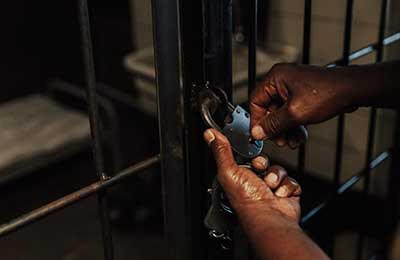尼泊尔监狱外的爱
时间:2022-05-29 12:18:44

Pushpa Basnet doesn’t need an alarm clock. Every morning, the sounds of 40 children wake her up in the two-story home she shares with them. As she helps the children dress for school, Basnet might appear to be a housemother 1)of sorts. But the real story is more complicated.All of these children once lived in Nepal’s prisons. This 28-year-old woman has saved every one of them from a life behind bars.
Nepal is one of the poorest countries in the world―according to 2)UNICEF, 55% of the population lives below the international poverty line―so it lacks the social safety net that exists in most Western nations.
So when no local guardian is available, an arrested parent often must choose between bringing their children to jail with them or letting them live on the streets.
Basnet is one of several in Nepal who have started groups to get children out of prison. Since 2005, she has assisted more than 100 children of 3)incarcerated parents.
Basnet was just 21 when she discovered her calling, she said. While her family ran a successful business, she was studying social work in college. As part of her studies, she visited a women’s prison and was 4)appalled by the 5)dire conditions. She also was shocked to discover children living behind bars.
One baby girl grabbed Basnet’s 6)shawl and gave her a big smile.
“I felt she was calling me,” Basnet said. “I went back home and told my parents about it. They told me it was a normal thing and that in a couple of days I’d forget it. But I couldn’t forget.”
Basnet decided to start a day care to get incarcerated children out from behind the prison walls. While her parents were against the idea at first―she had no job or way to sustain it financially―eventually they helped support her. But prison officials, government workers and even some of the imprisoned mothers she approached doubted that someone her age could handle such a project.
“When I started, nobody believed in me,”Basnet said. “People thought I was crazy. They laughed at me.”
But Basnet was 7)undaunted. She got friends to donate money, and she rented a building in 8)Kathmandu to house her new organization, the Early Childhood Development Center. She furnished it largely by convincing her parents that they needed a new refrigerator or kitchen table; when her parents’ replacement would arrive, she’d 9)whisk the old one to her center.
Just two months after she first visited the prison, Basnet began to care for five children. She picked them up at the prison every weekday morning, brought them to her center and then returned them in the afternoon. Basnet’s program was the first of its kind in Kathmandu; when she started, some of the children in her care had never been outside a prison.
Two years later, Basnet established the Butterfly Home, a children’s home where she herself has lived for the past five years. While she now has a few staff members who help her, Basnet is still very hands on.
“We do cooking, washing, shopping,”she said. “It’s amazing, I never get tired. (The children) give me the energy. ... The smiles of my children keep me motivated.”
Coordinating all of this is no easy task. But at the Butterfly Home, the older kids help care for the younger ones and everyone pitches in with household 10)chores. The atmosphere feels like an extremely large family, a feeling that’s fostered by Basnet, who smothers the children with love. The children 11)reciprocate by calling her “Mamu,” which means “Mommy.”
All the children are at the Butterfly Home with the 12)consent of the imprisoned parent. When Basnet hears about an imprisoned child, she’ll visit the prison―even in remote areas of the country―and tell the parent what she can provide. If the parent agrees, Basnet brings the child back.
She is still eager, however, for the children to maintain relationships with their parents. During school holidays, she sends the younger children to the prisons to visit, and she brings them food, clothing and fresh water during their stay. Ultimately, Basnet wants the families to reunite outside prison, and 60 of her children have been able to do just that.
In 2009, Basnet started a program to teach the parents how to make handicrafts, which she sells to raise money for the children’s care. Both mothers and fathers participate. It not only gives them skills that might help them support themselves when they’re released, but it also helps them feel connected to their children.
“Often, they think that they’re useless because they’re in prison,” Basnet said.“I want to make them feel that they are contributing back to us.”
Making ends meet is always a struggle, though. The children help by making greeting cards that Basnet sells as part of her handicraft business. In the past, she has sold her own jewelry and possessions to keep the center going.
Her biggest concern is trying to find ways to do more to give the children a better future. She recently set up a bank account to save for their higher educations, and one day she hopes to buy or build a house so they’ll always have a place to call home. Their happiness is always 13)foremost in her thoughts.
“This is what I want to do with my life,”she said. “It makes me feel good when I see that they are happy, but it makes me want to work harder. ... I want to fulfill all their dreams.”
普希帕・巴斯奈特不需要闹钟。每天清晨,和她同住在这栋两层楼房里40个孩子的声音会将她叫醒。看着普希帕帮孩子们穿好去上学的衣服,你或许觉得她有点像个女舍监。但真实的故事要复杂得多。所有这些孩子都曾经生活在尼泊尔的监狱里。这名28岁的女子将他们每一个人从牢狱生活中拯救了出来。
尼泊尔是世界上最贫穷的国家之一――根据联合国儿童基金会的调查显示,55%的人口生活在国际贫困线以下――所以这里缺少大多数西方国家都有的社会保障。
因此,如果被捕人士的子女在本地没有其他监护人,那他们往往须作二选一的抉择,要不把孩子带到监狱里一同坐牢,要不任其在街上流浪。
一些尼泊尔人已创建团体将孩子们接出监狱,而巴斯奈特便是其中之一。从2005年开始,她已经为100多个父母亲被监禁的孩子提供了帮助。
当巴斯奈特发现其使命时,年仅21岁,她说。那时她家的生意经营得很成功,而她则在大学里就读社会工作专业。作为其学业的一部分,她探访了一所女子监狱,并因其极度恶劣的环境而感到震惊,同时她还惊讶地发现竟然有孩子生活在监狱里。
一个小女孩抓住了巴斯奈特的披巾,向她露出一张大大的笑脸。
“我觉得她是在召唤我,” 巴斯奈特说。“回到家里,我对父母讲述了一切。他们告诉我说,这是件很平常的事情,过几天我就会忘记的。但我无法忘记。”
巴斯奈特决定开展一项日托服务,将被监禁的孩子从监狱的围墙内解救出来。她父母最初反对她的想法――她没有工作,也没经济资源维持这项服务――最后他们还是对她予以支持。但监狱官员,政府工作者,甚至她所接触到的一些身陷囹圄的母亲都怀疑,以她的年龄是否能够挑起这项计划。
“刚开始时,没有人信任我,”巴斯奈特说。“大家都认为我疯了。他们嘲笑我。”
但巴斯奈特并不气馁。她让朋友们给她捐款,而她也在加德满都为她的新组织――早期儿童发展中心租到了一栋房子作为场地。房子里的陈设大多数来自她家里,她说服父母购置新的冰箱或餐桌,当父母的新品到达时,她就把旧的搬到她的中心里。
仅仅在巴斯奈特第一次探监的两个月之后,她就开始照顾五个孩子。每个工作日的早上,她将他们从监狱接出来,带到她的中心,然后下午将他们送回去。在加德满都的同类计划中,巴斯奈特的是首创;当她刚开始这计划时,受她照顾的一些孩子以前从未步出过监狱。
两年之后,巴斯奈特创建了蝴蝶之家――一所儿童庇护中心,而过去的五年里,她自己也一直住在那里。尽管现在有几个员工帮忙,巴斯奈特仍然十分亲力亲为。
“我们要做饭、洗衣服、买东西,”她说。“很神奇,我从来都不觉得累。(孩子们)给了我力量。……孩子们的笑容让我充满了动力。”
协调这一切并非易事。但在蝴蝶之家,年长的孩子帮忙照顾幼儿,每个人都要分担一些日常杂务。整个氛围就像是一个超大的家庭,一种由巴斯奈特培养出来的氛围,她宠溺着这些孩子们。而孩子们则唤她为“妈妈”作为回报。
所有的孩子都要得到狱中父母亲的允许才能进入蝴蝶之家。每当巴斯奈特听说有一个孩子生活在狱中,她就会去那所监狱――即便是在这个国家的边远地区――然后告诉那位家长,她能提供什么帮助。如果那位家长同意的话,巴斯奈特就会把那个孩子带回来。
尽管如此,她依然期盼孩子们能够和他们的父母保持联系。在学校放假的日子里,她会让年幼的孩子们去探监,孩子逗留在里面期间,她会给他们带去食物、衣服和新鲜的水。最终,巴斯奈特希望这些家庭能够在监狱之外重聚,而她所照顾的其中60个孩子已经做到了这一点。
2009年,巴斯奈特开启了一个计划,教那些监狱里的家长制作手工艺品,用以筹钱照顾孩子。孩子们的父母亲都参与其中。这不仅教予了他们一技之长,或许还能帮助他们在出狱后维持生计,同时还有助于他们感觉到与自己的孩子保持着联系。
“他们常常认为自己毫无用处,因为他们身在狱中,”巴斯奈特说。“我希望让他们感觉到,他们正在为我们作出回报。”
不过,要达到收支平衡总是困难重重。孩子们帮忙制作贺卡,巴斯奈特将其出售,作为手工制品生意的一部分。在过去,她已经变卖了自己的珠宝和财产来维持中心的运作。
她最关心的是努力找出一些方法,为孩子们做得更多,给他们一个更好的未来。最近,她设立了一个银行账户为他们能够受到高等教育而存款,而她希望有一天能够买下或者建造一栋房子,这样他们就能永远拥有一个可称之为家的地方。在她的心里,他们的幸福永远都居于首位。
“这就是我想要为其贡献终生的事情,”她说。“看到他们过得快乐,我就感到欢喜,但这也让我想要更加努力地工作。……我想要实现他们所有的梦想。”